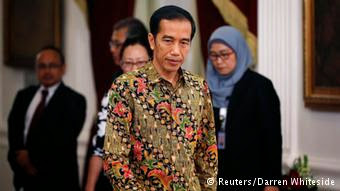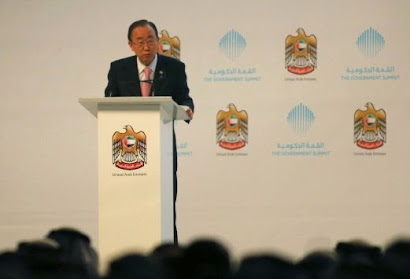Jakarta Globe, Bastiaan Scherpen, November 21, 2011
 |
The
controversial panel on the late 19th-century royal vehicle shows
colonial
subjects presenting gifts to their Dutch rulers. (AP Photo)
|
Related
articles
After a
brief controversy, a ruthless former governor-general of the Dutch East India
Company is back on his pedestal in his Holland birthplace. Literally, that is.
The statue
of Jan Pieterszoon Coen (1587-1629) in the city of Hoorn, North Holland province,
was accidentally hit by a vehicle during construction works in August. Despite
calls to use the opportunity to replace the effigy with one of a less
controversial figure than the man nicknamed the Butcher of Banda, the Hoorn
City Council in late September decided to restore the monument. It was placed
back on Oct. 19.
But the
dispute over the statue of Coen doesn’t stand alone.
Together
with a similar debate about a royal vehicle and a recent lawsuit over a
massacre by Dutch soldiers in a West Java village, it shows that 66 years after
Indonesia declared its independence from the Netherlands, the former colonial
power is finally, and slowly, coming to terms with the legacy of its
often-brutal rule in the archipelago.
Controversial
Carriage
Henk Schulte
Nordholt, head of research at the Royal Netherlands Institute of Southeast
Asian and Caribbean Studies (KITLV), says the Dutch are gradually starting to
realize that it cannot erase its colonial past.
“It will be
with us in various postcolonial manifestations,” he told the Jakarta Globe in
an e-mail exchange, citing migrants, food and memories as examples.
Yet this
growing awareness also leads to criticism of long-accepted practices. Dutch
lawmakers and rights activists recently called for a panel depicting a
controversial scene to be removed from a ceremonial vehicle owned by the royal
family.
 |
The controversial panel on the late 19th-century royal
vehicle shows colonial subjects presenting gifts
to their Dutch rulers. (AP Photo)
|
On the
horse-pulled Gouden Koets (Golden Carriage), colonial subjects — including
Javanese people — are shown apparently presenting gifts to their Dutch rulers.
The vehicle was a gift for then-Queen Wilhelmina by the citizens of Amsterdam
in 1898. It is still used every year to transport the Dutch monarch ahead of a
speech from the throne.
According
to Harry van Bommel from the Socialist Party and Mariko Peters from the
Green-Left party, the panel is reminiscent of a “gruesome period in Dutch
history.” In September, they urged Queen Beatrix to remove the disputed panel,
which is called Hulde der Kolonien ( Tribute of the Colonies).
Prime
Minister Mark Rutte, who is accountable for the royal family’s actions, spoke
of the request as “bizarre.”
“Rewriting
history by destroying the Golden Carriage, that’s not something I would
support,” Rutte, who holds a history degree, told a press conference.
Frans Grijzenhout,
a professor of art history from the University of Amsterdam (UvA), said the
carriage is a historical artifact that has full right to its integrity.
“It is no
use to infringe on that and remove parts from it as a consequence of new
insights into the position of the Dutch in the former colonies,” he said. “No
matter how valuable these insights may be.”
Rewriting
History
Both in
Indonesia and in the Netherlands, there is a need for a holistic approach to
the colonial past, said another expert, Bambang Purwanto.
“Like it or
not, Indonesia and the Netherlands for a long time shared their history. To
deny this is tantamount to fooling ourselves,” said Bambang, a history
professor from Yogyakarta’s Gadjah Mada University.
Grijzenhout
believes it would be a good idea to reconsider the way the colonial past is
represented in the Netherlands, citing the Monument Indie-Nederland
(Indies-Netherlands Monument) in Amsterdam as a good example.
Unveiled in
1935, that monument was meant to honor Gen. J.B. van Heutsz (1851-1924), a
commander of the Royal Netherlands East Indies Army (KNIL) and
governor-general.
In 2004,
the local government decided to change the monument into a memorial for all
aspects of Indonesia-Netherlands relations during the colonial period. All
references to Van Heutsz, who had gained particular notoriety after brutally
countering resistance in Aceh, were removed.
Rawagede
Ruling
In another
case that highlighted violent aspects of Dutch colonial rule, a court in The
Hague in September ordered the Netherlands to pay damages to relatives of
victims of the 1947 Rawagede massacre. The landmark ruling was hailed in
Indonesia.
By some
accounts, over 400 were killed in December 1947, when Dutch soldiers tried to
force people in Rawagede to give up the location an Indonesian soldier.
Schulte
Nordholt, who is also a professor at Amsterdam’s VU University, thinks it is
strange that the Netherlands is still prosecuting former Dutch members of the
German-led SS during the Second World War while at the same time trying to
“cover up crimes committed in Indonesia.”
“Apart from
Rawagede there are the killings by Raymond Westerling in South Sulawesi, with
3,000 victims,” Schulte Nordholt said. “The Dutch government was deeply
involved in a cover-up of this case and protected Westerling,” a move described
by the historian as “nothing less than a bloody shame.”
Westerling
led a vicious counterinsurgency operation in Sulawesi in 1946-47. He was never
prosecuted in the Netherlands, nor extradited to Indonesia.
But
monetary compensation might not be a cure-all solution.
“What would
our reaction be if the children and grandchildren of people murdered in the
Bersiap period would take their case to court?” Bambang said, referring to the
chaotic early days of the Indonesian Revolution, during which many people of
Indo-European descent, and others, were killed. “The same applies to East
Timor: don’t think that we are a nation without flaws and sins.”
Bambang
said a statement of apology would be preferable to money. “The true lesson from
history should be that such crimes against humanity should never happen again,”
he added.
Back on a
Pedestal
The
Netherlands has never formally apologized for cases like Rawagede or other
atrocities.
Under
Coen’s command, in 1621, thousands of residents of the Banda Islands were
massacred in an effort to monopolize the spice trade in the area.
The statue
of the Hoorn native was made in 1887 to commemorate his 300th birthday. A month
before it was damaged this year, the City Council of Hoorn, after being
petitioned to do so by citizens, decided to alter the text accompanying the
statue. The information should also reflect the violent side of Coen’s actions
in Asia, officials said at the time.
Today, the
statue is still accompanied by its old plaque, with a Dutch text providing
basic information about the man who founded Batavia, present-day Jakarta.
But Hoorn
is working on a more complete text, both in Dutch and in English. In a draft
version released last week, Coen is described not only as a “visionary
administrator,” but also as the architect of “aggressive policies.”
Bambang,
who also holds the Leiden University chair in the history of Dutch-Indonesia
relations, believes that replacing the controversial statue would have been a
mistake.
“Taking
away the statue of Coen would mean to deny the reality of the shared
Dutch-Indonesian history,” he said. “History brings not only good things, but
also misery, and all of that must be represented.”
The UvA’s
Grijzenhout also said Hoorn had made the right call. “It is never a good idea
to do away with the past, and much better to comment on it,” he said.
Coming to
terms with colonial history clearly is a work in process on both sides of the
old fence.
“We look at
it from different perspectives,” Schulte Nordholt said. “But in my cooperation
with Indonesian colleagues, as we try to define together new common research
themes, we increasingly feel that the colonial past is our common history,
which should not be marginalized or silenced.”

















